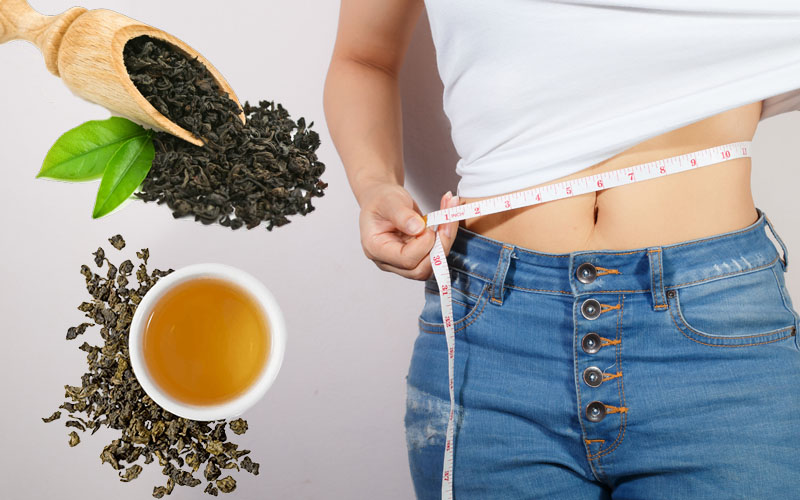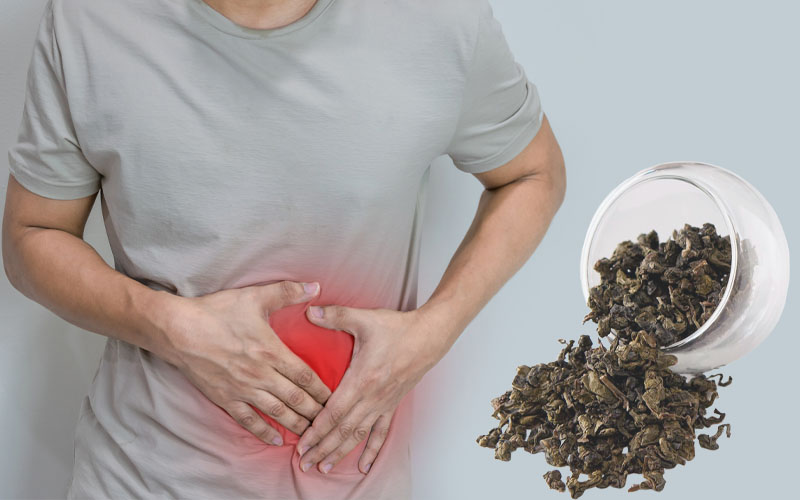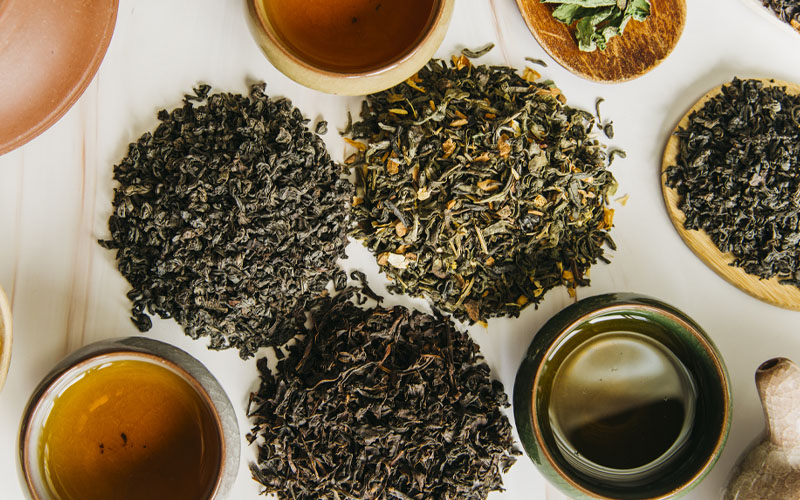From the time tea was first discovered accidentally by a Chinese emperor Shen Nung to the time today, a lot has changed. First, it was used for medicinal purposes only; then, later by the end of the seventeenth century, tea had become a regular drink of the elites.
But today, not only black, but certain other teas with much more health benefits are popular. One such tea is Oolong tea, which is said to be very healthy. So, let’s take a deep dive into what this Oolong tea is and what magical benefits does it possess.
Table of Contents
What is Oolong Tea?

It’s a semi-oxidized Chinese tea that undergoes a unique process, including withering under the direct sun and then partially oxidizing the leaves. That’s why Oolong tea is also called semi-fermented tea.
Oolong tea originated from the Fujian province of China, but now widely produced in Taiwan as well. It is still processed according to three centuries-old traditions.
Basic Steps in Oolong Tea Making
The processing of oolong tea is described in the following easy steps.
1. Harvesting
Tea leaves for oolong tea are typically harvested 3-4 times a year, with the possibility of 6 harvests at some farms even.
2. Withering
The leaves start to wither after harvesting, thanks to the enzymes in the leaves that start a chemical reaction. It’s up to the tea grower how he controls this withering process to make the desired taste of Oolong tea.
3. Oxidation
Chemically speaking, the cell walls of the tea leaves are broken in this step. In other words, the leaves are exposed to air or other methods where they can be oxidized.
Normally it’s done by putting the leaves in long woven bamboo cylinders.
4. Kill-Green Step
This is the control step, in which the oxidation is stopped if the desired level of oxidation is achieved.
Kill Green is the translation of the Chinese term, ‘Shaqing’, which means kill the green.
5. Rolling & Drying
Finally, once the Kill Green process is over, the Rolling & Drying process starts. The oxidized leaves are rolled with the help of modern machinery and then left for drying.
Nutritional Facts of Oolong Tea vs. Green & Black Teas
The following table is a glance at the dietary facts of Oolong tea in comparison with green and the traditional black tea.
| QTY | Oolong Tea | Green Tea | Black Tea | |
| Fluoride | (mg/8 ounces) | 0.1-0.2 | 0.3-0.4 | 0.2-0.5 |
| Caffeine | (mg/8 ounces) | 10-60 | 9-63 | 42-79 |
| Flavonoids: | 49.4 | 125.6 | 25.4 | |
| Epicatechin- EC | (mg/100ml) | 2.5 | 8.3 | 2.1 |
| Epicatechin Gallate – ECG | (mg/100ml) | 6.3 | 17.9 | 5.9 |
| Epigallocatechin – EGC | (mg/100ml) | 6.1 | 29.2 | 8.0 |
| Epigallocatechin Gallate – EGCG | (mg/100ml) | 34.5 | 70.2 | 9.4 |
One US cup has an 8-ounce capacity — lesser than a mug, which has approx. 11-ounce capacity.
Means one cup of Oolong tea will make you more alert than green or black tea; and, protect you from cancer, heart disease, stroke, and asthma more than black tea.
An important aspect here is the oolong tea caffeine, which is 10-60 mg/8ounce cup, or in other words, almost equal to what is present green tea but far lesser than in black tea.
Types of Oolong Tea
There are two main types of Oolong tea, depending on the processing method you follow. One is lightly oxidized, which undergoes 10 to 30% oxidation, giving a bright green, floral and buttery look.
The darker oolong tea, on the other hand, is oxidized up to 50-70%, to look more like black tea.
11 Health Benefits of Oolong Tea
Is oolong tea good for you? Let’s find it out
Oolong tea is healthy because it contains more antioxidants, like catechin than black or green tea. Not only catechin, but there are beneficial nutrients as well, including Caffeine, Theaflavine, phenolic compounds as Gallic acid, Chlorogenic acid, and Kaempferol-3-O-glucoside.
A study conducted on 30 different Chinese teas concluded that compared to other teas, Oolong tea has the strongest antioxidant capability.
Fun Facts
So, What does oolong tea do? Here are the 11 Oolong tea benefits you may get by including two or three cups of Oolong Tea in your daily diet.
1. Helpful in Weight Loss

Almost everyone today wants to look fit, and for this, people are always curious to find ways to lose weight. Sometimes people try fat burning massagers, sometimes belts, which do help but are time-consuming.
While you are familiar with green tea benefits in this regard, oolong has also proved its worth in the field of weight reduction. Like green tea, Oolong tea is made by drying the leaves in direct sun. Its abundant amount of catechin helps reduce weight faster than any other beverage.
In research, more than 65% of obese people who took oolong tea every day for six weeks were able to lose 1 kg weight approximately.
A research was conducted to determine if Oolong tea helped in the reduction of diet-induced obesity. And it was concluded that it helped reducing body weight by improving one’s lipid metabolism.
The reason why it improves metabolism is that it blocks the enzymes that build fats. Moreover, caffeine in it provides you energy the way coffee does, so you can do more work out, which ultimately means lesser weight.
2. Improves Heart Health
This famous Chinese tea is also proved to have worked in improving heart health.
i. Lowers Cholesterol
In fact, according to a study, it helps lower the risk of dyslipidemia, in which the cholesterols or fats (lipids) in the blood elevate.
The dyslipidemia patient has blocked arteries, cardiac arrests, stroke, and other circulatory system disruptions.
In 2010-2011 a study was conducted in southern China, where Oolong tea is most widely consumed. The study aimed to know the relationship between oolong tea consumption and the risk of dyslipidemia.
And it was concluded that only oolong tea among other teas was found to be associated with low HDL-cholesterol level.
ii. Reduction in Heart Disease Mortality
About 647,000 people in the United States die with heart diseases every year. Means after every 37 seconds, there is one death due to some cardiovascular disease.
A study was conducted with 76000 Japanese people aged 40-79 to know the effects of oolong and other hot beverages on heart disease mortality.
It was ensured that neither of them had any cardiovascular disease or cancer. It was concluded that caffeine intake from oolong and other hot beverages was associated with a reduced risk of cardiovascular mortality.
So, Oolong tea is beneficial in reducing this risk of heart disease.
3. Help Fighting Breast Cancer

According to the World Health Organization (WHO), in 2018, nearly 627,000 women died of breast cancer, that is, 15% of all cancer-related deaths in women around the globe.
In anti-cancer research at Saint Louis University in collaboration with Fujian Medical University, it was discovered that oolong tea damages the DNA of breast cancer cells and hinders the growth of tumors.
This is the reason why breast-cancer related deaths are the least in the oolong-tea origin, Fujian; means, 35% lesser breast cancer incidences, and 38% lower death rates compared to other parts of China.
4. Helps Prevent Bone Loss in Old Women

In addition to its other magical effects, Oolong tea helps to reduce bone loss in older women, especially moms. Osteoporosis is the process in which bone becomes weak and tends to break easier than normal. It’s a common disease among women who reach the age of menopause.
A research was conducted to analyze the impact of Oolong tea in bone loss prevention in post-menopausal Han Chinese women. It was found that regular drinking of Oolong tea helped prevent bone loss, especially in post-menopausal women.
5. Strengthens Teeth

We all know from our childhood that Fluoride is something that our teeth direly need. It makes our teeth healthy so that they tend to fall or break less and are less often prone to dental diseases.
One of the specialties of the Oolong plant is that it extracts Fluorides from the soil, which then resides on its leaves. Therefore oolong tea is very rich in Fluorides. In a cup of oolong tea, there is approx. 0.3mg to 0.5 mg of Fluoride.
So, the more you drink oolong tea, the stronger it will make your teeth.
Besides drinking it as a tea, a solution of Oolong tea extracts plus ethanol was found to significantly stop the plaque deposition in person who rinsed it in his mouth before and after the meals and before going to bed.
6. Helps against Chronic Inflammation

Polyphenols, an active bioactive compound in Oolong tea, boost the immune system and thus help to decrease inflammation.
Inflammation is usually of two types, Acute and Chronic. Acute may be helpful for the body, but Chronic does not. Chronic inflammation occurs due to the unwanted substances in the blood, such as excessive fat cells or toxins from smoking. Drinking Oolong tea helps as it works as an anti-inflammatory activity of the body.
7. Improves Digestive System

Its antibacterial function helps our body work better against the bacteria and other germs that tend to affect our gut health. Also, its alkali effect decreases heartburn by decreasing acid refluxes.
Since it is rich in Polyphenols, it’s much beneficial for microecology due to its bioactive metabolites, and module-wise effect of intestinal microbiota.
The more microbes you have in your gut, the lesser the risk of getting infected with certain allergies.
Today, processed food has made it impossible to produce microbes, and therefore Oolong tea helps in producing them.
8. Helps in Improving Intestinal Health

Does oolong tea have caffeine? Yes, like coffee or black tea, the caffeine in Oolong tea alerts you and improves your mental performance.
It means, while you are at office drowsing and unable to do your task with due attention, a steaming mug of Oolong tea can be of great help. In fact, if you know a friend who remains stressed during his working hours, a packet of Oolong tea is a great tea gift for him.
A study conducted to check the effects of caffeine and theanine on vigilance concluded that error rates of those who used tea were significantly reduced.
The polyphenols are also proved to have a soothing effect, minutes after intake.
Another study was performed to check the relationship between cognitive impairment and tea. Cognitive impairment is difficulty in remembering, learning new things, focusing, or decision-making in daily life. The study concluded that those who took oolong and other teas had a lower occurrence of cognitive impairment.
9. Helps in Skin Allergies

What are oolong tea skin benefits? Oolong tea benefits for skin are amazing.
About 16.5 million people in the United States have a moderate to severe Atopic Dermatitis or Eczema, a condition in which itchy inflammation occurs on the skin, especially on the arms and behind the knees, for which many people resort to wearing gloves for domestic chores like washing dishes and cleaning carpets.
Japanese researchers reported that drinking Oolong tea thrice a day help in the relief of Atopic Dermatitis. In this experiment, 118 Dermatitis patients were served a total of one liter of Oolong tea thrice a day. More than 60% showed improvement after 30 days, whereas quite surprisingly few of them improved within seven days just.
The reason behind this functionality of Oolong tea is due to the presence of Polyphenols in it. Through their antioxidant activity and ability to oxidize free radicals, Polyphenols are the ones that fight various allergens.
10. Helps in Hair Growth

Are you worried because of your short hairs, that do not let you use your favorite scrunchie?
You need not worry anymore. Oolong tea has a solution. One of the oolong benefits includes help in hair growth, thanks to its antioxidant capability. That is the reason it’s widely used in certain hair care products. Oolong tea extracts, along with some herbs, not only help in hair growth but also reduces the chances of hair fall.
11. Helps Reduce Type-2 Diabetes
Among many of the oolong tea benefits, reducing Type-2 diabetes is the most important one.
A study was conducted in Taiwan to determine the efficacy of oolong tea in lowering plasma glucose in type 2 diabetic patients. And it was concluded that taking oolong tea for weeks helps to lower the concentration of plasma glucose and fructosamine in type -2 diabetic patients.
Can I drink Oolong Tea Daily?

The answer is yes!
However, 3-4 doses of oolong tea in one of your favorite mugs for hot drinks is a sufficient intake to get its health benefits.
On the other hand, excessive intake, like 7-10 cups daily, is harmful.
An excessive dosage of caffeine stimulates brain function more than required and results in a rise in blood pressure, which is extremely dangerous in the long term.
Are there any side effects of Oolong Tea?
Like any other tea, it does not have any side-affect if consumed normally. But if the unusually high dosage of Oolong tea is taken, it will result in headaches, sleep problems, confusion, etc.
People who are allergic to caffeine should avoid drinking it. Hypokalemia is a life-threatening condition that’s linked with the toxicity of caffeine.
Besides this, side effects in the form of kidney stones, stomach pain, fluorosis in skeleton due to the consumption of tea in large amount has also been reported.
Talking about kidney stones alone, it’s worth mentioning that it’s not oolong tea oolong that’s harmful to the person having kidney stones. Instead, all types of teas, ranging from black to green, have oxalates in them that help in the formation of kidney stones.
But luckily, oolong tea has a mere 0.23 to 1.15 mg/g tea of oxalates in it, as compared to 4.68 to 5.11mg/g tea in black tea, which is too less to worry about.
Also, drinking tea too much can decrease one’s ability to absorb vitamins got from plant sources. That is the reason it’s not recommended for children to drink tea.
Also, if taken along with the meal, it can hinder the iron absorption process. So, nursing and pregnant women should avoid it or drink it less often.
What is Wulong Tea?
Wulong is not a new type of tea. Instead, it’s a rare type of oolong tea that has catechins and polyphenols much more than any other kind. It is placed in between green and black teas because of semi-oxidization. It’s 100% natural with no chemicals, pesticides, or any artificial flavor added.
Wulong tea has an amazing taste, suppresses your appetite, full of catechins and polyphenols, and above all, burns more than calories than green tea.
Oolong Tea vs. Green Tea vs. Black Tea

According to the Oregon State University study, Oolong tea leaves are oxidized more than green tea but lesser than black tea before they are dried. Catechin, Thearubigin, and Theaflucin in Oolong tea are lesser than completely oxidized black tea but more than green tea.
- Is Oolong and Green Tea the same? (Oolong vs. Green Tea)
Most people think it so, but they aren’t the same. Both teas are indeed got from the same plant, Camellia sinensis, yet the difference still lies.
The difference is the processing methods of the two. Green tea is non-fermented, whereas the oolong tea is semi-fermented.
Green tea involves the use of young tea leaves that do not undergo any kind of fermentation process after withering. Here, the Pan firing method is used to prevent it from fermenting.
On the other hand, oolong tea is produced by partial oxidation of the leaves, an intermediate process for green and black teas.
Talking about the nutrients, Green tea is far more mature than white tea but lesser than black tea. It does have catechins in it, but the amount varies with respect to the cultivation area. Their antioxidant capabilities are different due to the presence of other non-catechin antioxidants.
How different is Black Tea from Oolong Tea?
Not to mention that all three teas, black, green, and Oolong are obtained from the same plant, Camellia sinensis. The only difference is the processing method through which each of the tea undergoes.
Black tea is called fermented tea. The leaves are allowed to ferment for several hours before being steamed, flame fired, or smoke fired.
In the first step for black tea processing, first tea levs are exposed to air to let them oxidize. As a result, the leaves turn brown, and the flavor intensifies and then heated or left as it is.
On the other hand, Oolong tea is semi-oxidized, which means they are exposed to air for much lesser than black tea.
Speaking in terms of Chemistry, Black tea leaves are completely broken to maximize the reaction between catechin and polyphenol oxidase.
Since they are allowed to oxidize before drying completely, they are low in monomeric flavin and rich in Thearubigins and Theaflavins. Theaflavins are known to have higher antioxidant capabilities than others.
Where to buy Oolong tea?
Like rare commodities, you need not worry about where to buy oolong tea. Instead, it’s easily available online or at your nearest herbal tea store.
But before you buy, here are some tips.
Whether you’re buying it from your favorite retail store or ordering online, there are some tips to buy specialty beverages, like Oolong tea.
Bear in mind that Oolong tea is produced in Korea and Taiwan. So, any seller that’s based on either of these countries or trusted enough that he imports directly from the source, you may buy from him.
Besides this, while purchasing online, good ratings and reviews are a few of the indications that oolong tea can be purchased from them.
Conclusion: Is Oolong Tea Good For You?
Seeing the benefits of oolong tea, are you going to include it in your favorite beverages’ list? If you need to get relief from stress after a tedious work-day, this tea can be your best partner.
So, fill your infuser mug with oolong tea leaves having cup notes of your favorite nuts that can let you enjoy your work at the office or home besides making you lead a healthy life, away from fatal diseases.
Have you tried it yet?


I would like to try this Oolong tea where do I get it on line? what website?
You can buy it from any local herbal-tea store, or online from any store with a good product review.